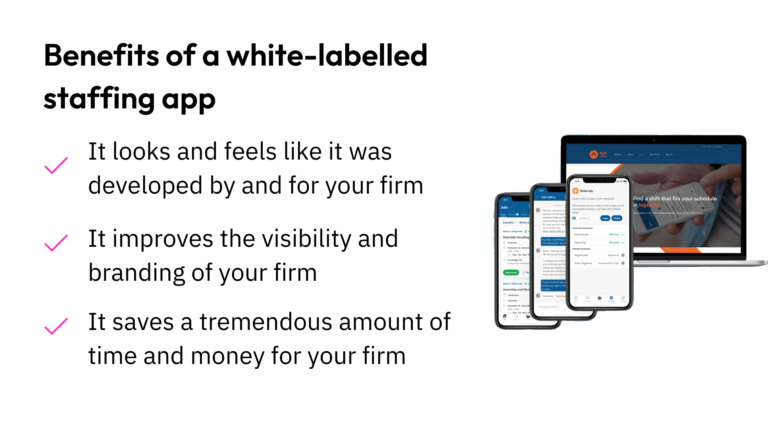White-labelled apps have become a hot topic in the staffing industry in recent years. More and more companies are taking advantage of white-labelling staffing apps to make their software and services more authentic. However, many still misunderstand this term. So, what does it mean to white-label something and how can that be beneficial to an agency?
Interested in learning more about white-labelled staffing apps? Download our full guide.
Definition of white labelling
White-labelling is the process of customizing, labelling and localizing software or apps for the specific third-party company using it. Essentially, that means that elements of a company such as the logo and colours will be applied to the tool so that it integrates perfectly with the rest of the branding and marketing of the company. Furthermore, true white-labelled staffing apps can be customized with specific features and tools that the company needs most. This can be useful if an agency is interested in integrations with a website or other software.
Benefits of white labelling
A white-labelled staffing app makes the software feel much more organic and native to the company. The idea is to make the app look and feel like it was developed by and for your firm.
Additionally, it improves the visibility and branding of your firm. There are many types of advertisements out there, and it’s become increasingly difficult to stand out as a company. With a white-labelled staffing platform, every time a client or candidate opens or displays your app, your brand is one of the first things they see. Over time, that distinctiveness becomes hard to forget and will build a lot of loyalty to your firm.
White-labelling also saves a tremendous amount of time and money. When you license technology from a software as a service provider, you never pay the same amount as it would cost to develop it yourself. That means you can choose the best of what is on the market without spending months, or potentially years, building it on your own. The product will be well-refined and suitable for your needs.

White labelled apps for staffing agencies
Recruiters and managers in the staffing space focus on people-to-people interactions. They work on building up clients and finding the right staff for each position. For that reason, it makes more sense for them to outsource building apps and software rather than build it internally. Staffing companies should seek out software providers that allow them to white-label their apps to meet their own branding and messaging needs.
Building a staffing app goes beyond cost. Think about support, maintenance, and updates that are necessary after the app is released. Hiring and training a new team of software developers at a staffing agency would be a deviation from time spent relationship-building with clients and candidates. With a white-labelled staffing app, that’s all taken care of.
The rise of white labelled staffing apps
The world of apps in the staffing sector is truly exploding. Firms without these tools risk losing out to the competition. Fortunately, a white-label tool can quickly and painlessly produce a native app that meets your needs and helps you reach your candidates where they already want to be.
Want to learn more about why candidates are looking for on-demand staffing apps? Take a deep dive into staffing platforms or book a meeting with a specialist on our team.



